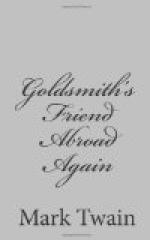There were twelve or fifteen Chinamen in our crowd of prisoners, charged with all manner of little thefts and misdemeanors, and their cases were quickly disposed of, as a general thing. When the charge came from a policeman or other white man, he made his statement and that was the end of it, unless the Chinaman’s lawyer could find some white person to testify in his client’s behalf, for, neither the accused Chinaman nor his countrymen being allowed to say anything, the statement of the officers or other white person was amply sufficient to convict. So, as I said, the Chinamen’s cases were quickly disposed of, and fines and imprisonment promptly distributed among them. In one or two of the cases the charges against Chinamen were brought by Chinamen themselves, and in those cases Chinamen testified against Chinamen, through the interpreter; but the fixed rule of the court being that the preponderance of testimony in such cases should determine the prisoner’s guilt or innocence, and there being nothing very binding about an oath administered to the lower orders of our people without the ancient solemnity of cutting off a chicken’s head and burning some yellow paper at the same time, the interested parties naturally drum up a cloud of witnesses who are cheerfully willing to give evidence without ever knowing anything about the matter in hand. The judge has a custom of rattling through with as much of this testimony as his patience will stand, and then shutting off the rest and striking an average.
By noon all the business of the court was finished, and then several of us who had not fared well were remanded to prison; the judge went home; the lawyers, and officers, and spectators departed their several ways, and left the uncomely court-room to silence, solitude, and Stiggers, the newspaper reporter, which latter would now write up his items (said an ancient Chinaman to me), in the which he would praise all the policemen indiscriminately and abuse the Chinamen and dead people.
AhSong hi.



